- Home
- Lin Oliver
The Shadow Mask Page 2
The Shadow Mask Read online
Page 2
“Here’s the stairs to the ground,” Hollis said.
A narrow metal stairwell was in front of us, disappearing down into the darkness. I could see a few old footprints on the first steps, surrounded by inches of dust. It might have been years ago, but Crane had used this escape route at least once.
“They look pretty rickety, Leo. We should go slow.”
“No time,” I said. “Crane’s on our trail, I know it. Gimme your phone for a light.”
Hollis chucked it to me, and I led us down the narrow stairwell. The stairs were metal and shaky — they seemed to be just an old fire escape built into the building. After the first few creaky flights, I went faster and faster until I was taking three at a time, this terrible dread growing in my chest.
My only thought: Get to the car, Leo, and everything will be fine.
I could figure everything else out later.
Finally, we reached the ground floor, just a small concrete landing with oily corners and a giant door with a push bar wrapped in chains. I cracked it open and felt a blast of freezing February air. We were around the corner from the front of the building, and I just barely saw the trunk of Stump’s limo.
“I’ll go first,” Hollis said. “See if it’s clear. Oh, and give me my phone back.”
“Here. Thanks, Hollis, really. We’ll be all right.”
“No sweat, bro. Wish me luck.”
Hollis strutted out into the gray morning and walked over to Stump’s limo with perfect nonchalance. When he was halfway there, I couldn’t wait any longer, so I slipped out of the darkness and crept toward the waiting limo, hiding in the shadows and behind garbage cans as I went. Stump was standing by the car, the door open, waiting patiently in his driving cap, his usual red plastic straw hanging from his mouth. Once Hollis was in, I broke my cover and walked with a fake confidence toward the open door of the limo.
I was within thirty steps. I could see inside it, the velvet upholstery glowing in the purple neon light. My adrenaline was pumping like crazy. I was going to make it! Crane wouldn’t be able to touch me. I saw Hollis’s legs inside, and I broke into a run.
Hearing me, Stump turned to face me, and I smiled at him from ear to ear. But he didn’t smile back. He just chomped on his red straw frantically, looked at something behind me, then looked away. I stopped dead in my tracks.
I felt a hand on my shoulder.
“Not so fast, Leon.”
Crane.
I didn’t answer. I couldn’t even move.
“Stump,” Crane said from behind me. “Hollis is late for school.”
Stump nodded, then looked me right in the eyes. His arm twitched, and he seemed to search for something in his pocket. He looked back at me again and opened his mouth, letting the straw fall from it.
“But what about —” he started.
“Go on, Stump,” Dmitri said, suddenly emerging from the lobby and taking his place right next to Crane.
“Now, Stump,” Crane said. Sharply.
Stump shrugged at me and adjusted his cap. Slamming the door, he ran around to the driver’s seat, with Hollis pounding on the tinted windows and trying to open the locked door. The car sped off as Hollis popped his head out of the sunroof. I broke free and ran after him.
“Leo!” he shouted as the car disappeared around the corner.
All I could do was watch him go.
After the car turned the corner and disappeared, I kind of lost it. I think I flailed my arms or something ridiculous like that, but I’m not really sure. I remember this sinking feeling, as if the ground was melting away beneath my feet. When I snapped back to myself, I realized I was staring into the darkness of a storm drain, and I had an eerie feeling that a very small part of me, like a miniature version of my body, had split off and fled down the sewer. I was missing something, something important, almost like I’d tossed my keys or my wallet down the drain.
Then I heard someone pick up my backpack and felt a hand on my shoulder. From the way the touch made me shudder, I knew it was Dmitri.
“Come on, Leo,” he said, and pushed me back to where Crane was waiting.
Crane was standing in the middle of our desolate street, looking tremendously out of place in his expensive clothes amidst the crumbling buildings. I couldn’t see his face, just the top of his shiny bald head as his fingers moved across the keyboard of his phone. He didn’t even give me the courtesy of looking up, just had Dmitri guide me to him.
Don’t show him any emotions, I told myself. Don’t feel anything. I briefly considered jumping Dmitri, wrestling him to the ground, and then taking off. But where would I go?
“I didn’t do anything, Uncle Crane,” I said as Dmitri pushed me in front of him.
Crane ignored me as if I were completely invisible. Just kept typing on his phone.
“I had nothing to do with that thing on TV,” I tried again.
“Oh, Leo,” he said, still not even glancing my way. “I’m touched that you believe you hurt me and my business, but you think too much of yourself. You’re a pesky mosquito at best. And I have trained myself to ignore itches.”
“Are you going to send me to some boot camp? You promised you wouldn’t split Hollis and me up if … if …”
Crane looked up from his phone. “Go on.”
“If I helped you locate the other half of that Siamese twin mask.”
“You remember. Good,” he said, and returned his gaze to his phone. “Dmitri, go fetch your bag for school.”
“Yes, Mr. Crane.”
“Do you have your MetroCard, Leo?” Crane asked when Dmitri had trotted away.
“Yeah, I’ve got it,” I said, and took out my wallet. “I can take the subway to school, no problem. I’ll be late, but that’s okay. So I better get started. Got a long walk to the subway station, but I could use the exercise. Glad we had this talk, Uncle Crane.”
Crane threw his head back and laughed.
“Leon,” he chuckled. “You’re no longer enrolled at your old school. I’ve been so busy with my paperwork that it seems I forgot to send in your out-of-borough waiver. How foolish of me.”
“I’m ready, Mr. Crane,” Dmitri said as he walked up to us and put his hand on my shoulder. His grip was tight.
“You’ll be going to school with Dmitri for the time being, Leo. No more of that lah-di-dah Academy of Science and Arts for you. No, now you’ll get a chance to see what it’s like when the world isn’t handed to you. The way I was raised: fighting and clawing for every scrap I could get. Just like Dmitri here. Maybe then, you’ll understand that you shouldn’t bite the hand that feeds you, little Leon.”
“You can’t take me out of my school!”
“Really? I believe I already have.”
“But —” I stood there with my mouth open.
“Don’t worry, Leo. Dmitri will make certain that no school-yard toughs harass you for your milk money.”
“Milk money?” I said blankly, repeating Crane as if I were dreaming.
Crane reached into his pocket, fished out a fifty-cent piece, and put it in my coat pocket, patting it twice.
“But, Uncle Crane,” I stammered. “I said I would help you.”
“That you did, Leo. Now I can be certain you will. I’ll see you shortly at school for our meeting with the assistant principal. Until then, I have a lawsuit to prepare against your good friend Mike Hazel.”
“Crane, I swear, I had nothing to do with that!”
“Enjoy your subway ride, little Leon,” he said.
“Wait. Can’t we ride with you?”
“Sorry, my dear nephew. My limo isn’t available to boys who feel compelled to blab family secrets to the media.”
Flashing me a crooked grin, he slithered off into the dank lobby of the building, hollering, “Klevko!”
“It’s okay,” Dmitri said to me. “I have a business at school, so I can buy you lunch today. After today, you’ll have to work.”
“What subway do we take to school?” I
asked, removing Dmitri’s hand from my shoulder. Even though I was being forced to ride with him, I wasn’t going to let him shove me around.
“Crane is wrong. No subway. We take the bus. Two buses. But first, we run.” Dmitri tossed my bag at me. “Follow me.” He put on his beanie, then gave me a “friendly” sock to the gut. When I looked up, he was halfway down the block.
We took two buses to school, but all I could think about the whole time was how I could call Hollis. He had probably assumed the worst — that I was already on a plane, shipped off to Sergeant Hammerfist’s Tough Love Academy for Troubled Youths somewhere in uncharted Alaska. The best I could hope for was that Stump had been in on Crane’s plan and had let Hollis know I was okay. But I couldn’t rely on Stump to be a decent human being anymore, not after he’d turned on me. No, I needed to talk to Hollis, to tell him personally that I was okay.
Dmitri was no help. He pretended to sleep on both bus rides, but I knew he was really watching and listening to everything I did because every now and then, when he thought I wasn’t looking, he would crack open an eyelid. Don’t show him anything, I told myself. Feel nothing.
Our bus arrived at Satellite North Middle School at 8:45 and pulled up behind Crane’s waiting limo. We were so late that all the kids were already inside. When Dmitri and I approached the limo, the back door opened, and Crane got out. Dmitri scurried past him, ran up the steps, and through the front doors. Crane looked me up and down disapprovingly, then smoothed out my clothes with his hand.
“Your personal grooming leaves much to be desired,” he said.
“You have to tell me, Crane,” I said, rejecting his attempt to plaster down my unruly hair. “What are you going to do to me?”
“Leo, I’ve done nothing but fail to turn in some paperwork. A problem that can be easily fixed, if you have the right attitude. This isn’t a punishment, but a chance for you to build some character, eh? Now let’s get to our meeting.”
We had to pass a security checkpoint and go through a metal detector to get inside the building. I only saw a few kids in the hallways, but they seemed much bigger and tougher than me. And although the halls were mostly deserted, they were ringing with echoes of walkie-talkie communications and distant voices and laughter that somehow seemed in a different key.
While we waited to see the assistant principal, Crane ducked out to take a number of phone calls, while I listened to Ms. Confalone, the school secretary, answer the phone in her no-nonsense Brooklyn accent. I tried to remain inconspicuous to the row of kids waiting on the “bad kid” bench, but that would have required a Romulan cloaking device. I knew they were watching me like hawks, and every now and then, one of them would say something in another language and gesture at me, and then they’d all laugh. When Ms. Confalone told me I could go into Mr. Dickerson’s office, I was more than ready to go alone.
“Welcome to Satellite North, Leo,” Mr. Dickerson said from his desk, hardly even glancing up from the file of papers in his hands. He had hairy hands, and he was a hulking man, seemingly much too big for his beige suit and small desk. He had a big round head, a forehead filled with worry lines and bushy eyebrows, a comb-over, and a giant veiny neck that made his collar button seem about to pop. I sat down.
“Just going over your permanent record, Leo. You’ve missed quite a lot of school lately.”
“Yeah, um, my parents died a month ago….”
“Oh yes, I see,” he mumbled, and scribbled a few notes on the paper. “My condolences. And who is Crane Rathbone?”
“My uncle.”
“And he’s your guardian?”
I told him yes. Mr. Dickerson grunted, scratched his giant neck, and made more notes, while I just sat there twirling my shoelaces and looking at his collection of old model cars.
“You’re almost half a semester behind, Leo. Think you can get caught up?”
“Definitely. But I’m not supposed to be here,” I sputtered. “I go to the Academy of Science and Arts.”
“Went to,” he said. “Let’s see. You’ve got a 72 average in Spanish and a 67 average in Math….”
“But I have great scores in Music and Science.”
He furrowed his brow and squinted at the paper, making a clicking sound with his tongue as he shuffled through more pages and scratched some more neck hair.
“Those are electives,” he answered. “And I’m seeing lots of disciplinary write-ups, Leo. Care to explain?”
“Disciplinary write-ups? Let me see that file. I told you I’m not supposed to be here.”
The office door opened and I heard the tail end of an argument outside, then Crane slid into the room.
“Forgive me, Mr. Dickerson,” he said, patting me stiffly on my arm as he sat down. “Business. Yet I hope my absence gave you a chance to get to know my nephew.”
“Indeed, Mr. Rathbone,” he said, not even looking up. “Indeed. A mixed file, I would say. Slightly above average state test scores, some areas of proficiency, some areas that need much improvement, and an overarching disciplinary problem.” He took out a calculator from a desk drawer and punched numbers into it for a really long time. “For a 75 percent overall average …”
“Average,” Crane echoed him, and winked at me.
“But what about Science and Music?” I tried again.
“They don’t factor in. Leo does show some promise, Mr. Rathbone, but he has a poor work ethic and a history of behavior problems.”
“I’ve noticed the same problems myself, Mr. Dickerson. My nephew, here, needs discipline. I hope you can straighten him out.”
“Well, we’ll certainly try,” he said, scribbling more notes.
“And please feel free to contact me directly if Leo acts up, especially any unexplained absences,” Crane said, handing him a card. “Leo’s education is my top priority.”
The walkie-talkie on Mr. Dickerson’s desk jumped with static, and a muffled woman’s voice said something about a fight in the boys’ bathroom. “On my way,” he grumbled into it, and somehow managed to squeeze into his tiny sport coat. Then he closed up my file, shoved it at me, and told me to get my schedule printout from Ms. Confalone.
Mr. Dickerson hurried out in a huff, and I followed him, handing my permanent record to Ms. Confalone. I felt like some sort of criminal being admitted to a prison. As I waited for her to print out my schedule, Crane pinched my cheek and said, “Study hard, little Leon.” This sent all the kids on the bench into hysterics. The damage done, Crane left without a good-bye. The kids continued to snicker, and one of them said, “Be a good boy, little Leon,” in a high-pitched voice.
Ms. Confalone gave them a stern look. “Hey, you guys, knock it off. There’s nothing funny here. You could try saying hello to the new kid.”
No one did. Just more snickering. I pulled out my beanie from my coat pocket, put it on, and pulled it down low.
“Here you go, Leo Lomax,” Ms. Confalone said, handing me my schedule and giving me a much-needed smile. I let myself smile back. “And swing by if you got questions. A new school can be tough. But you’ll catch on. I got confidence.”
“Thanks, Ms. Confalone,” I said, scanning my schedule. I had English, Math, History, and Spanish, with Music and Science only once a week. And next to my name, it said “basic track.”
“Ms. Confalone,” I said, taking off my hat.
“That’s me, Leo.”
I got really close to her and showed her the paper. “It says basic track here, but I’ve always been in honors track.”
“You think you’re supposed to be in honors track?” she repeated, much too loud. All the kids on the bench cracked up and started saying things in another language. “Sorry, Leo, the paper says basic track. You’ll have to talk to Mr. Dickerson about making the switch. Do you want an appointment?”
“Nah, don’t bother,” I said, putting my hat back on and pulling it down so low it practically covered my eyes. “Bye, Ms. Confalone,” I said, and walked out.
“Bye-b
ye, honors boy,” one of the kids teased.
“Look, there goes Leon the gifted child,” another said.
A third said something in what sounded like Polish or Russian, and they all cracked up, their hyenalike echoes following me into the deserted hallway.
I had already missed most of my first-period math class. I had ten minutes before I was supposed to be in second-period History, which left me no time to waste. I had to get to a phone … urgently. I needed to talk to Hollis, to let him know I was okay — well, not okay, but at least alive and in New York. Funny, when our parents were taking care of us, I never worried about Hollis one bit. Never really gave him a second thought. He was just my pain-in-the-neck kid brother. Now that they were gone, my only thought was to get to a phone and hear the little punk’s voice.
I raced up and down the main hall, its flickering fluorescent lights making the musty walls seem a sickly shade of yellow-green. I remembered seeing a pay phone in one of the hallways, but I couldn’t recall where. Even if I found it, I’d still have to break that ridiculous fifty-cent piece to make the call. I thought maybe the cafeteria was open and would have change. I stopped and listened, my hearing particularly sharp like it sometimes was just before a sound-bending experience. Over the buzzing of the fluorescent lights, I heard the faraway clanging of dishes rattling against one another. I turned down a hall and followed the sound, which led me to double doors with a sign that read CAFETERIA. Peering through the small pane of glass, I saw a guy stacking dishes next to the food line.
I pounded on the window, and he looked up, then shook his head no. He didn’t even know what I wanted, and the answer was automatically no. I thought of Kay, the cafeteria lady at the Academy of Science and Arts, who always let me in early to get a hot chocolate before first period. Already, after not even an hour in this dreary cave of a school, Kay and her cheerful smile seemed like a dim, unreal memory.
I wandered back to the main hall where I spotted a sheepish-looking kid with glasses, digging into his locker. He was smaller than me, so I approached him.
“Hey, do you have some change?”

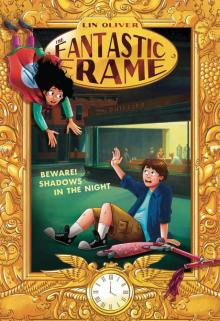 Beware! Shadows in the Night
Beware! Shadows in the Night Almost Identical #1
Almost Identical #1 Two-Faced #2
Two-Faced #2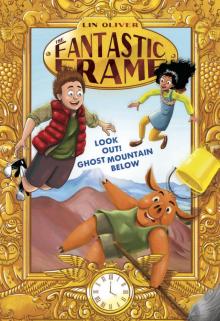 Look Out! Ghost Mountain Below
Look Out! Ghost Mountain Below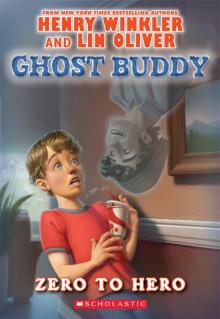 Zero to Hero
Zero to Hero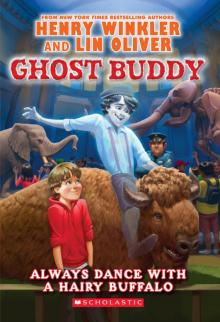 Always Dance with a Hairy Buffalo
Always Dance with a Hairy Buffalo Danger! Tiger Crossing
Danger! Tiger Crossing Twice As Nice
Twice As Nice Double-Crossed
Double-Crossed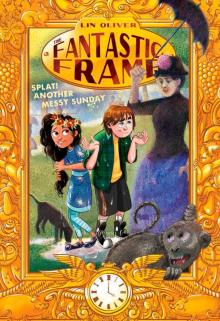 Splat! Another Messy Sunday
Splat! Another Messy Sunday The Shadow Mask
The Shadow Mask